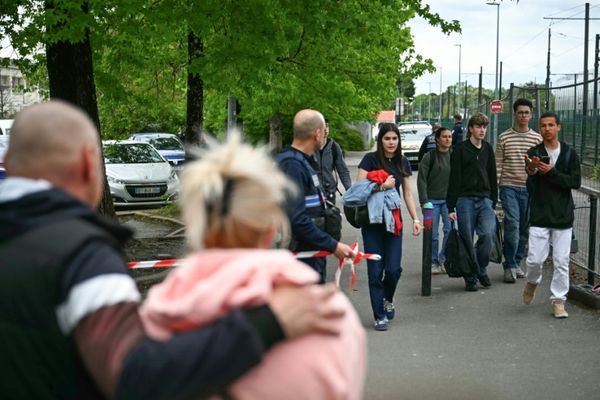
Former members of Amy Coney Barrett’s secretive faith group, the People of Praise, are calling on the US supreme court justice to recuse herself from an upcoming case involving gay rights, saying Barrett’s continued affiliation with the Christian group means she has participated in discriminatory policies against LGBTQ+ people.
The former members are part of a network of “survivors” of the controversial charismatic group who say Barrett’s “lifelong and continued” membership in the People of Praise make her too biased to fairly adjudicate an upcoming case that will decide whether private business owners have a right to decline services to potential clients based on their sexual orientation.
They point to Barrett’s former role on the board of Trinity Schools Inc, a private group of Christian schools that is affiliated with the People of Praise and, in effect, barred children of same-sex parents from attending the school.
A faculty guide published in 2015, the year Barrett joined the board, said “blatant sexual immorality” – which the guide said included “homosexual acts” – had “no place in the culture of Trinity Schools”. The discriminatory policies were in place before and after Barrett joined.
The schools’ attitude, the former People of Praise members said, reflect the Christian group’s staunchly anti-gay beliefs and adherence to traditional family values, including – they say – expelling or ostracizing members of the People of Praise “community” who came out as gay later in life or their gay children.
“I don’t believe that someone in her position, who is a member of this group, could put those biases aside, especially in a decision like the one coming up,” said Maura Sullivan, a 46-year-old who was raised in the People of Praise community in South Bend, Indiana. Sullivan identifies as bisexual and recalls coming out to her parents, who were members of the People of Praise, when she was 19.
“They decided that I wasn’t allowed to be around my sister, who was 13 at the time, without them around, because I could ‘influence’ her in bad ways. Stuff like that. So I had a tenuous relationship with my family,” she said. “To be cut off from my family was the ultimate loss of community.” Sullivan and her parents, who are no longer members of the faith group, have since repaired their relationship, she said.
Questions about the People of Praise’s attitude toward LGBTQ+ members and their families, and Trinity Schools’ policies, have resurfaced because the supreme court will hear oral arguments on 5 December in the case of 303 Creative LLC v Elenis.
It centers on a Christian website developer, Lori Smith, who has claimed an anti-discrimination law in Colorado has violated her right to free speech over same-sex marriage, which she says goes against her religious faith. Smith has said the Colorado law has forced her to “create messages that go against my deeply held beliefs” since she cannot legally turn away gay couples seeking her website services.
Barrett said in her confirmation hearing that her personal religious beliefs would not interfere with her abilities to be an unbiased judge. Conservatives have also lashed out against any suggestion that her affiliation with a Christian sect could compromise her independence.
But some former members of the faith group say they see a big difference between judges who have faith and are religious, and Barrett’s affiliation with the People of Praise, a tight-knit community whose members agree to a lifelong covenant of loyalty to one another.
Like other charismatic Christian groups that were established in the 1970s, People of Praise members attend regular meetings, are encouraged to live communally, practice speaking in tongues and adhere to guidelines set by male leaders, or heads of a community.
“The People of Praise has deeply entrenched, anti-gay values that negatively affect the lives of real people, including vulnerable youth. These values show up in the everyday policies of the People of Praise and their schools. They are policies that are way outside the mainstream, and most Americans would be disturbed by them,” said Kevin Connolly, a former member of the People of Praise who is the brother of the group’s chief spokesperson. Connolly has previously made public remarks about physical abuse he suffered at the hands of his father.

Barrett has never publicly acknowledged her membership in the community since becoming a judge and did not disclose it during her 2020 confirmation. It was reported at the time that the People of Praise erased all mentions and photos of her from its website ahead of her meetings with lawmakers.
Tom Henry, a 24-year-old former student at a Trinity school who works as a psychiatric nurse, recalled incidents during his time at Trinity in which he was discouraged from being open about his sexuality.
In one case, he was told in art class that he could not draw a picture of Harvey Milk, the gay activist and San Francisco politician who was killed in 1978, because it was “too political”. In his service as a student ambassador, he also recalled approaching his director at the time, Jon Balsbaugh – who is now president of Trinity Schools – and asking him about an inquiry from a parent of a gay child.
“He said there was a policy, and it was basically a public stance that they don’t support gay marriage or people transitioning, and he blatantly said you just tell them that this would not be a good place for them,” Henry said. “I just remember being so shocked because he blatantly said it.”
Neither Balsbaugh nor the People of Praise responded to a request for comment.







